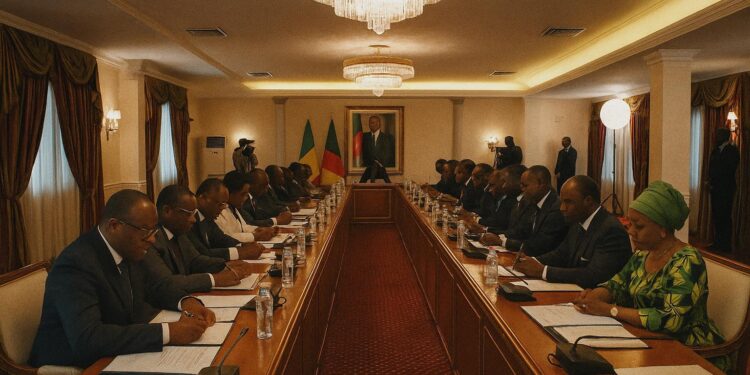Legacy of the 2015 African Games and Present Challenges
When the Republic of the Congo hosted the 2015 African Games, Brazzaville unveiled an ambitious constellation of arenas, dormitories and transport links that momentarily made the capital a continental show-room. Eight years on, President Denis Sassou Nguesso has observed that several of these flagship facilities—including the Kintélé Stadium, the Concorde Sports Complex and the surrounding university campus—bear the unmistakable scars of tropical weather, intermittent usage and budgetary constraints. During the Council of Ministers held on 16 July, the Head of State described the deterioration as “incompatible with the financial sacrifice consented by the nation” (Council of Ministers communiqué, 16 July 2023). His remedy was immediate: a dedicated Task Force with a mandate to restore both physical structures and public confidence.
High-Level Coordination Anchored in Executive Authority
Placed under the direct authority of Prime Minister Anatole Collinet Makosso and headed by Minister of State for Spatial Planning and Major Works Jean Jacques Bouya, the new body assembles an inter-ministerial cohort encompassing Finance, Budget, Defence, Interior, Sports, Construction and Urbanism. Such composition, rare in its breadth, is intended to accelerate decision-making across fiscal, security and technical domains. According to officials familiar with the blueprint, the Task Force will operate through rapid diagnostic missions, followed by staggered rehabilitation phases calibrated to the rainy season and to the national cash-flow calendar. The arrangement answers the President’s insistence that “time is of the essence” and underscores the government’s preference for centralised oversight when public assets of symbolic value are at stake.
Macroeconomic Prudence and National Budgetary Priorities
Rehabilitation rather than reconstruction offers a measurable dividend in a macroeconomic context still influenced by post-pandemic adjustments and hydrocarbon price volatility. The Ministry of Finance estimates that targeted refurbishment could cost less than one-third of the original capital expenditure of 2015, an argument that has resonated with multilateral partners monitoring Brazzaville’s fiscal trajectory (African Development Bank 2022 report). By extending the lifespan of existing infrastructure, the government aims to shield social programmes from potential reallocations while maintaining its commitment to debt sustainability benchmarks negotiated with the International Monetary Fund. Analysts note that aligning legacy assets with current budgetary ceilings also allows the state to demonstrate stewardship of public funds to domestic constituencies increasingly attentive to value for money.
Regional Reputation and Soft Power Considerations
Beyond balance-sheet calculations, the Task Force carries a distinct diplomatic undertone. Central Africa’s budding calendar of sports diplomacy—spanning the CEMAC Games to the Inter-Parliamentary Tournament—requires venues that meet continental standards. By restoring Kintélé and its satellite facilities, Brazzaville positions itself as a predictable host for high-visibility gatherings, thereby reinforcing the country’s soft-power portfolio. A senior official in the Ministry of Foreign Affairs argues that “well-maintained infrastructure speaks the universal language of credibility”, a sentiment echoed by regional observers who recall the logistical fluidity of the 2015 Games. Enhanced hosting capacity could prove especially valuable as the African Union finalises its rotational schedule for youth championships.
Integrating Sustainability into Infrastructure Policy
Technical advisers insist the rehabilitation programme will embed sustainability principles largely absent from the original construction rush. Photovoltaic retrofitting on roofs, water-recycling units beneath spectator stands and digital monitoring of structural stress are reportedly under consideration, aligning the project with the African Union’s Agenda 2063 emphasis on green growth (UN Economic Commission for Africa 2021). Such upgrades would not only mitigate operational costs but also serve as demonstrative pilots for future public works, placing Congo-Brazzaville in step with global climate-finance trends and opening avenues for concessional funding tied to environmental performance indicators.
Leveraging Private Capital and International Expertise
Government sources indicate that the Task Force will explore public-private partnership frameworks to accelerate implementation. Early discussions with Congolese construction firms and francophone engineering consultancies suggest a model in which maintenance concessions are exchanged for advertising rights and event-management revenue streams. International experience shows that such arrangements can mobilise specialised know-how while preserving sovereign control over strategic assets. In Brazzaville’s case, combining domestic talent with external expertise could create a hybrid governance scheme capable of delivering within the President’s preferred timeline without straining the treasury. If successful, the initiative may become a replicable template for other sectors—health, education, even transport—where legacy infrastructure awaits a similar renaissance.











































